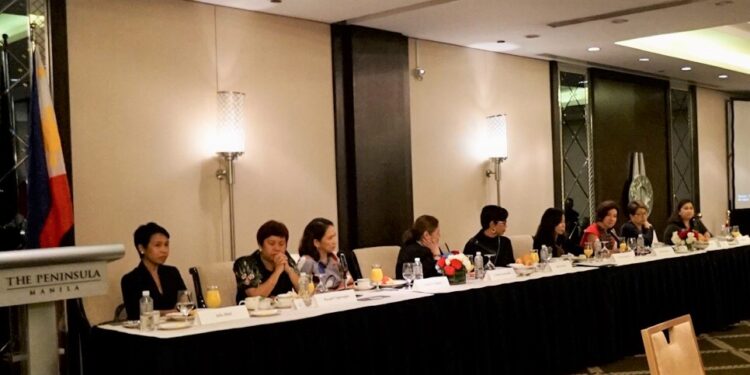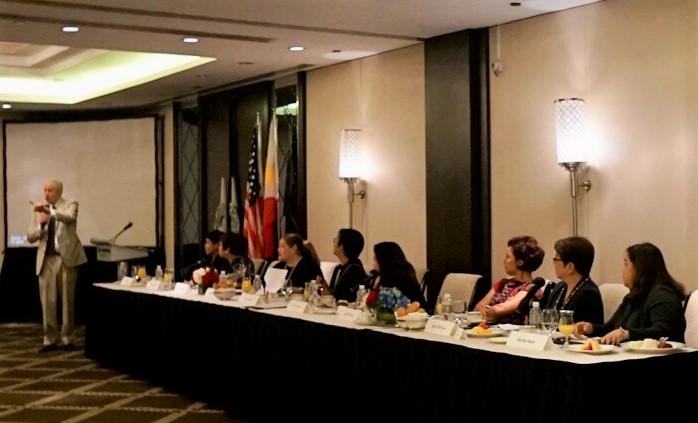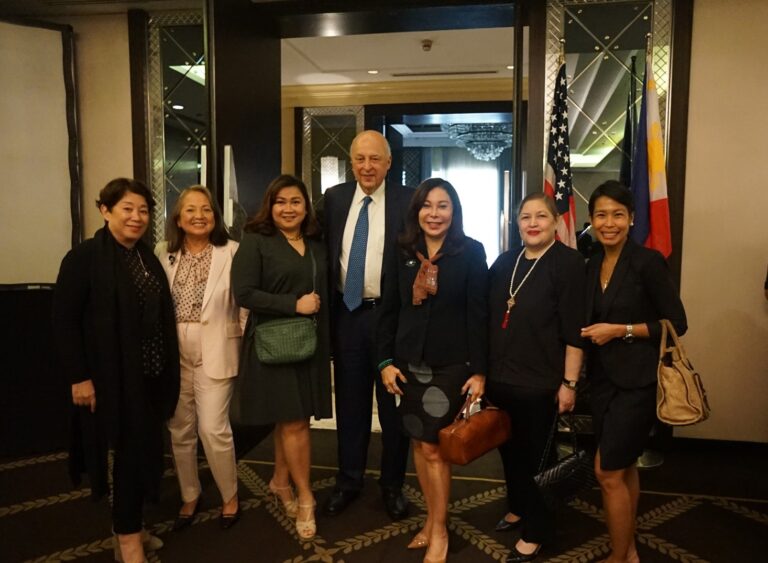Philippine Women Leaders in Business and Civil Society

Marking International Women’s Day and Women’s History Month:
Influential Philippine Women Leaders in Business and Civil Society
Makati City – A highlight of the US-Philippines Society Board program in Manila was a January 31 presentation by a distinguished panel of Philippine women entrepreneurs and innovators across key sectors of the Philippine economy. They are chief executive officers of business enterprises engaged in real estate, infrastructure, multi-specialty clinics and diagnostic centers, business process operations, renewable energy, financial services and digital payments. They are members of social enterprises providing jobs and training in artificial intelligence, machine learning and data preparation for women across the globe in partnership with Meta and Microsoft, advocating for women in the coffee industry across countries, and in corporate boards.
These women leaders navigate through challenges, including in male-dominated industries, to become experts in their field. Martha Sazon is CEO and President of Mynt which operates GCash, the number one e-wallet or digital payment service in the Philippines. By providing affordable and easy access to financial services including the unbanked business customers and owners, its registered users tripled during the pandemic to 76 million. Her company works with leading U.S. companies including PayPal, Western Union and MoneyGram.
Combining business acumen and her advocacies, Pacita Juan started her own coffee farm and encouraged farmers to form tourism clusters around their farms. She is also a board member of a renewable energy company with an innovative approach to implanting vegetables around solar farms now called AgroSolar farms.
They are visionary leaders providing solutions to emerging challenges. To address housing backlog, Emma Imperial of Imperial Homes started in 2014, a community of solar-powered homes that is affordable and by utilizing cutting edge technology are disaster-resilient that can withstand typhoons, earthquakes and fire. She established a consortium of key stakeholders of the real estate ecosystem – solar developers, fintech groups, bankers and retailers – to sustain and digitize the process of owning a home.
In line with the current administration’s push for major infrastructure projects, Aboitiz InfraCapital President and CEO Cosette Canilao is optimistic that private sector participation in key infrastructure projects will help alleviate transportation woes of a rapidly expanding population, address water shortage and digital connectivity gaps.
The successes of the panelists can be attributed to a comparatively more developed role of women in the Philippines, a country that elected two woman-presidents, Presidents Corazon Aquino (1986-1992) and Gloria Macapagal Arroyo (2001-2010). The United Nations Human Development Report reveals that over many years (1990-2021), the Philippines Gender Equality Measure is among the highest in East Asia and within medium range globally. The World Economic Forum study also supports the same findings.
Ambassador Thomas Hubbard observed that a factor is how the “strength of the Philippine family supports women enabling them to both work productively, and be rewarded, and raise families at the same time.” Another cultural factor is that family responsibilities including childcare are customarily shared within an extended network of families and caregivers.
Julia Abad, Executive Director of Philippine Business Coalition for Women Empowerment similarly noted that “the Philippines has quite a good enabling environment for women to go into work.” However, she added, “our problem is really the implementation of those policies.” In her line of work, she conducts workforce assessments looking at diversity in all levels and recommends an action plan that often requires an organizational culture change. She finds that upon closer look job segregation keeps women in administrative and support roles.
Several of the panelists are members of Connected Women, Philippine Women’s Economic Network or the Filipina CEO Circle that collectively encourages women empowerment in business settings and the grooming of next generation women leaders to get into professional directorship programs and entrepreneurship.
Panelists would welcome public policies to advance women in the workplace, in particular, policies that recognize the economic and social value of women in all levels, direct deliberate efforts in driving gender diversification, accessibility of early education in the field of science, technology and math, and facilitate an environment conducive to work-family balance.
The US-Philippines Society thanked Director Doris Magsaysay-Ho, CEO of Magsaysay Group of Companies engaged in shipping, transport, and human resources. She serves as mentor to Philippine women leaders as founding director of these resourceful women’s networks. We also recognized with special thanks US-Philippines Society member and former CEO of AirAsia Inc. Philippines Maan Hontiveros who collaborated and inspired this program with today’s Philippines influential women.
In his closing remarks, Ambassador John F. Maisto reiterated the importance to focus our awareness on issues that confront women including the daily struggle of balancing work and family, and of Philippine nurses in the United States, mainly women who are “unsung heroes” on the frontlines of the Covid 19 pandemic.
We join the United Nations’ celebration of the International Women’s Day in March. The UN’s 2023 theme centers on closing a “persistent gender gap in digital access that keeps women from unlocking technology’s full potential. Their underrepresentation in STEM education and careers remains a major barrier to their participation in tech design and governance.”

L-R: USPHS Director Doris Magsaysay Ho, USPHS Member Maan Hontiveros, Martha Sazon, Co-Chair Amb John Negroponte, Emma Imperial, Cristina Concepcion and Julia Abad. Makati City, Philippines. 31 January 2023.

